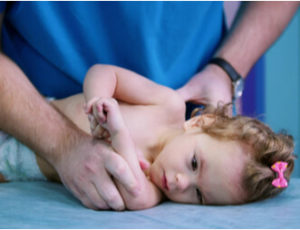Connecticut Cerebral Palsy Attorney

When you first discovered you were having a baby, you may have had high hopes for your child. You looked forward to meeting the newest addition to your family and finding out who your child would become. You assumed your child would be able to walk without assistance and to live a life free of chronic pain. Instead, your child has Cerebral Palsy.
A group of disorders which affect the brain and nervous system, Cerebral Palsy can often be caused by the negligence of health care providers before, during, or just after your child’s birth. When birth injuries cause your child a lifetime of problems speaking and moving, when you watch your child struggle to swallow or even to use the bathroom independently, who should pay for the damages?
When Cerebral Palsy changes the course of your child’s life, Kocian Law Group will help you obtain fair compensation for the lifelong consequences of medical malpractice.
Identifying Cerebral Palsy
Evidence of Cerebral Palsy becomes apparent in early childhood, usually before the age of two. Some symptoms include:
- Delayed childhood development, including difficulties walking, crawling, or rolling over
- Walking on the toes
- Clenching and unclenching fists involuntarily
- Holding arms close to the body
- Muscle weakness
- Joint contracture, in which joints don’t open all the way
- Tremors
- Lack of coordination
- Writhing of extremities
- Learning disabilities
- Sensory problems, including trouble seeing and hearing
- Seizures
- Pain
- Urinary incontinence
- Constipation
- Difficulty swallowing
If you suspect your child has Cerebral Palsy, you should contact your doctor immediately. Treatment can help mitigate some of the difficulties of the condition.
Diagnosing Cerebral Palsy
Diagnosis of Cerebral Palsy is performed by a physician, often one who specializes in neurological conditions. There are five main types of Cerebral Palsy:
- Spastic: This is the most common form of Cerebral Palsy. Misbehaving nerves in the spine signal muscles to contract. The muscles become very stiff and tight, making it hard for a person to move. The muscles also relax suddenly, causing involuntary spasms.
- Dyskinetic: Also known as Athetoid Cerebral Palsy. People with this form have low muscle tone, making sitting up or standing difficult. In addition, muscles may move randomly and constantly.
- Ataxic: This form affects balance. People with ataxic Cerebral Palsy may be prone to swaying back and forth.
- Hypotonic: In this form, a person’s muscles flop around weakly.
- Mixed: This is a mixture of the above types.
Causes of Cerebral Palsy
Cerebral Palsy can be caused by many events that can occur during the birthing process. Some events that are known to cause Cerebral Palsy include:
- Brain injuries prior, during, or shortly after birth
- Hypoxia (low oxygen levels) in the brain. Hypoxia can occur if doctors leave an umbilical cord wrapped around a child’s neck for too long. It can also occur if a baby spends too long in the birth canal.
- Brain infections such as encephalitis in either the child or the mother. If doctors catch a disease like this quickly, they can prevent permanent damage. If a doctor fails to notice any illness in a baby or a pregnant woman, it can have long-term consequences for the baby.
- Complications during birth. Complications during birth that may cause cerebral palsy include doctors waiting too long to perform a C-section, failing to notice a drop in your baby’s heart rate, or using excessive force with forceps or a vacuum extractor.
Those with Cerebral Palsy require consistent and specialized medical care. Prescription medications such as antispasmodics, anticonvulsants, and laxatives may be used to treat symptoms. Long-term therapy, including physical therapy or occupational therapy, can help a person with Cerebral Palsy maximize his or her independence, and special equipment like wheelchairs or leg braces may be prescribed to improve mobility.
Treatment doesn’t end there. Doctors may recommend surgeries to manage pain and place feeding tubes. Visits to specialized physicians such as neurologists or gastroenterologists may also be necessary throughout the person’s life. A person who has Cerebral Palsy or who has a child with Cerebral Palsy may wonder who will pay for all of these medical necessities. At Kocian Law Group, we pride ourselves on standing up for those injured through no fault of their own and obtaining fair and just compensation from those responsible for the injuries
How can Kocian Law Group help me and my child?
Under Connecticut law, every doctor, nurse, and hospital has a legal duty to act within reasonable standards of care when attending to patients. At Kocian Law Group, our birth injury lawyers will review and evaluate your or your child’s medical records. We’ll also have the records reviewed by qualified leading physicians across the country to assess and determine whether or not a failure to meet the standard of care caused permanent damages to your child. We rely on our vast network of physicians, our research abilities, and our years of experience in representing those medical malpractice claims to fight for the needs of each person we represent.
Children with Cerebral Palsy may not be capable of caring for themselves. In addition to assisting with your medical malpractice case, Kocian Law Group can help you establish a life-care plan for your child so that they will be well cared for during their lifetime, even after current family members are no longer available to provide the necessary care.






